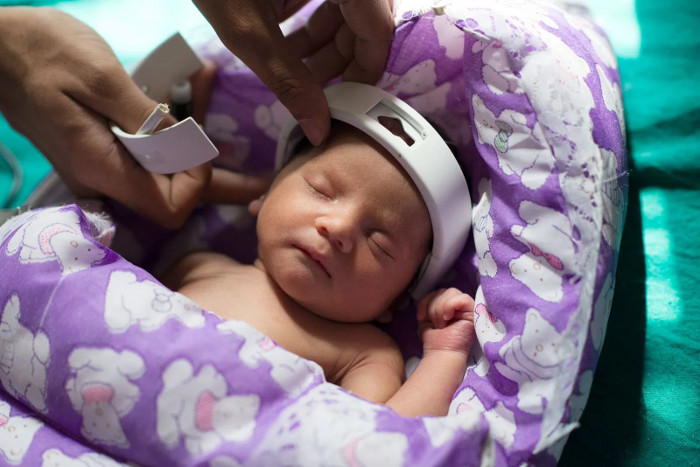Mexico invented a device for rapid diagnosis of deafness in newborns
Scientists from Queretaro University (UAQ) in Mexico have successfully invented a device capable of quickly diagnosing deafness in newborns.
The reporter in Mexico City gave a speech on April 2 by Mr. Juvenal Rodríguez Reséndiz - UAQ's Automation Technical Coordinator, saying the device includes a digital processor that stimulates the auditory nerve cells, allows to determine whether infants are able to perceive sound or not.

Artwork: wallpaper.com.
This device emits a signal in a section configured by an algorithm to determine the stimulating frequencies to the child's hearing. A signal will be sent to the hearing to stimulate nerve cells and some areas of the cerebral cortex, then be retrieved and sent to the microprocessor to produce results.
According to Reséndiz, newborns cannot yet explain verbally when we give stimulating signals to auditory nerve cells, but through brain responses it can give a quick diagnosis.
The successful invention of a device for the rapid diagnosis of deafness in newborns is the result of a combination of technical experts in the fields of psychology and medicine, automation technology, mechatronics, UAQ process and control equipment, biomedical, industrial and manufacturing, industrial engineering design.
- Saliva tests find the risk of deafness in newborns
- Ebola eZYSCREEN - Ebola detection device in 15 minutes
- Russia invented bio-hybrid equipment to help early diagnosis of cancer
- Smart paper guessing disease
- New research: Testing HIV by USB
- Messaging device through the ground
- Can completely cure deafness in 5 - 10 years
- Australia developed a method for rapid diagnosis of skin cancer
- It was possible to test 8 types of cancer and 9 other diseases with just one breath
- Using smartphones can cause temporary deafness
- Noise pollution, easy to cause disease
- Brazil manufactures equipment to diagnose dengue fever in 15 minutes
 Green tea cleans teeth better than mouthwash?
Green tea cleans teeth better than mouthwash? Death kiss: This is why you should not let anyone kiss your baby's lips
Death kiss: This is why you should not let anyone kiss your baby's lips What is salmonellosis?
What is salmonellosis? Caution should be exercised when using aloe vera through eating and drinking
Caution should be exercised when using aloe vera through eating and drinking